
 Tyler Kuehl
The Hockey Writers
Tyler Kuehl
The Hockey Writers
50
Reads
0
Comments
NCAA Hockey National Championship History: The 1960s
Since the initial tournament in Colorado Springs in 1948, 72 programs have been crowned the best team in college hockey in the United States. Some obviously won more than others, while others are proud to be champions, even if it was just one time.
The second decade of the national tournament still featured the same four-team format as it had, schools that ended the 50s strong, such as Denver and North Dakota, took the reins as powerhouses across the college hockey landscape, along with a team in Michigan’s Upper Peninsula, who came to the forefront as one of the top teams in the NCAA.
1960: University of Denver
Remember how tenuous it was to read about how good Michigan was in my last piece? Well, in the 60s, Denver was that good.
After winning in 1958, the Pioneers narrowly missed out on a tournament berth the following season. In the 1959-60 campaign, the Pioneers put together, at that time, the best season in NCAA history. Denver set a new record for wins, 25, while dropping only four games and tying three. The Pioneers that were so exceptional, that they defeated and tied the eventual gold medal-winning United States Olympic Team, while tying the Soviet Red Army team as well.
Related: Top 10 Worst Mike Milbury Moves
Denver was led by All-American Bill Masterton, who finished fourth in the country in scoring with 67 points, and his 46 assists were more than anyone in the NCAA. Captain John MacMillan finished second on the team in scoring with 55 points in 34 games.
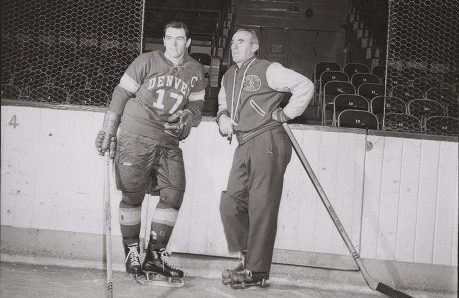
Denver won a share of the newly-formed Western Collegiate Hockey Association (WCHA) crown along with the Michigan Tech Huskies, and made it to the final after squeaking by Boston University in the semifinals. There they met the Huskies, who beat the Pioneers three times during the regular season.
DU went out in front, before the Huskies came back with three goals in the second period to take a 3-2 lead. However, Denver came back with three of their own in the third, capped off by MacMillan, who scored the game-winning and empty-net goals to give the Pioneers their second championship.
1961: University of Denver
If the 1960 champs were not already good enough, the 1960-61 Pioneers were even better. After winning a total of 27 games the previous season, Denver broke their own record, winning 30 of the 32 games they played. Their only loss came to Michigan Tech, and Denver surrendered a tie later in the season as well.
Their roster was stacked from top-to-bottom. The Pioneers featured four All-Americans. Masteron and Jerry Walker leading the offence, Marty Howe and Grant Munro holding the blue line, and George Kirkwood, the country’s leader in goals-against-average (1.84 GAA) and shutouts (4), manning the pipes. Walker was second in the NCAA in scoring with 85 points, with Masteron right behind him with 80 of his own.
Denver made easy work of Minnesota in the semifinals, setting up a meeting with St. Lawrence, who were making their first championship game appearance.
The match was no contest. Even though the Saints struck first, the Pioneers dominated the play, winning their third title in four years by a score of 12-2. Masterton scored five points in the win, three goals and two assists, while Munro chimed in with two goals and two assists of his own.
1962: Michigan Tech University
A very small school stuck in the fin of Michigan’s Upper Peninsula, Michigan Technological University, had begun to build a competitive hockey program in the 1950s, behind the leadership of head coach John MacInnes. After falling one win short in 1960, the Huskies looked to make it back to the promised land.
After losing their first two games to open the 1961-62 season, the Huskies only lost one of their final 28 games to take the WCHA regular season and conference championships. Similar to Denver the year before, the Huskies had a plethora of All-Americans. With Evov Seger and Henry Akervall manning the blue line, Jerry Sullivan and Lou Angotti led the scoring for Michigan Tech.
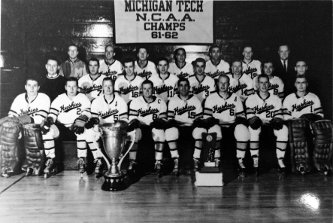
Michigan Tech made easy work of St. Lawrence in the semifinals to meet up with Clarkson in the finals. Despite the relatively balanced play, it was the Huskies who were able to take advantage of their opportunities. Sullivan and Angotti each scored a pair, while John Ivanitz potted a hat trick, as Michigan Tech won their first national championship by a score of 6-1.
1963: University of North Dakota
When North Dakota took home the crown in 1959, it looked they could win a few more in the near future. However, it was their WCHA rival Denver stealing the glory. The 1962-63 season saw the Fighting Sioux make their way through the season with a 20-7-3 record, including splitting the season series with the Pioneers.
All-Americans Al McLean and Dave Merrifield led the Sioux attack. McLean led North Dakota with 53 points, good for seventh in the country. Merrifield was not too bad himself, scoring 51 points and finishing eighth in the NCAA, right behind Merrifield.
The Sioux entered the tournament with an at-large bid after losing in the WCHA Championship Game to Denver. After making quick work of Boston College, North Dakota and Denver met for the sixth time that season in the championship game.
The first period featured a lot of scoring, with the underdog North Dakota controlling the play. The Sioux went up 3-0, before the Pioneers came back with a pair of their own. Two more goals in the first, and another in the second, put North Dakota up by a score of 6-2. The Pioneers made a valiant effort to come back, but fell short as the Sioux won their second title by a score of 6-5.
1964: University of Michigan
In what probably felt like an eternity, the Wolverines had not made it to the championship game since 1957. After missing out on the tournament completely in 1963, the 1963-64 Wolverines looked like their old selves under head coach, and former captain, Al Renfrew.
Michigan went 22-4-1 in the regular season, capturing the WCHA regular-season championship. The offence was led by the three-headed monster of Gary Butler, Gordon Wilkie and Wilf Martin. Butler finished third in the country in scoring with 68 points, leading the NCAA with 38 goals. All-American Wilkie finished fourth in the country with 67 points, while Martin was right behind the two of them with 58 points, good for fifth in the NCAA.
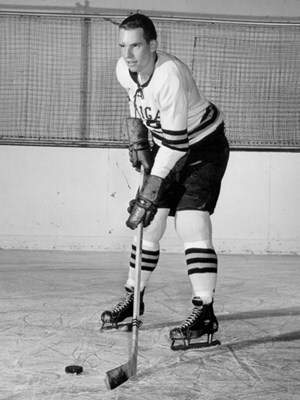
The Wolverines squeaked by Eastern Collegiate Athletic Conference (ECAC) Champion Providence in the semis to meet with Denver for the sixth time that season. Even though the Pioneers outshot the Wolverines, Bob Gray held the fort in goal, and behind Mel Wakabayashi’s two goals, Michigan won their first championship since 1956 with a 6-3 victory.
1965: Michigan Tech University
After their first championship, the Huskies suffered a slight hangover the following two seasons, as they were unable to make the tournament in either 1963 or 1964. In the 1964-65 season, Michigan Tech rose back to the top in a big way.
The Huskies shot back up the WCHA standings with a 22-5-2 record, finishing second in the conference. While their offence was steadied by the likes of Wayne Weller and Gary Milroy, it was the play of future Hall-of-Famer Tony Esposito that was the key to Michigan Tech’s success. Esposito posted the second-best GAA (2.35) and save percentage (.912 SV%) in the country.
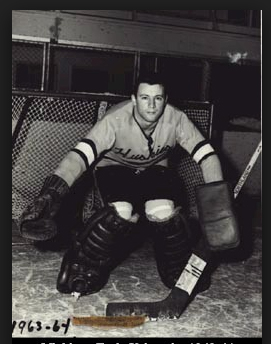
The Huskies made it to the tournament thanks to their WCHA tournament win over North Dakota, and went to the final after a win over Brown Univesity. This pitted the Huskies against Boston College, a team that had not been to the final since their 1949 win.
On paper, the matchup seemed close. Yet, when the puck dropped, it was all Michigan Tech. The Huskies jumped to a 6-0 lead by the early stages of the second period, and coasted the rest of the way to their second championship of the decade. Weller, Milroy and Bob Wilson each scored twice for the Huskies in their 8-2 win.
1966: Michigan State University
While schools such as Denver, North Dakota and Michigan Tech ruled the WCHA in the 1960s, a growing school in the state capital of Michigan was competitive, but not quite good enough to compete the with nation’s best.
That was, until the 1965-66 season, when the Michigan State Spartans stunned the college hockey world. Overall, the team finished just above the .500 mark, but only went 9-11 in conference action. Yet, the Spartans went on to win a share of the WCHA conference championship after defeating rival Michigan and upsetting regular-season champion Michigan Tech.
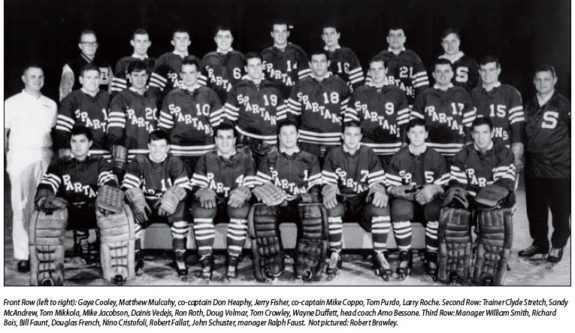
The true standout for the Spartans that season was All-American Doug Volmar. Volmar, who led Michigan State in goals, assists and points, finished tied for fourth in the country in scoring with 54 points. He was able to lead MSU to the school’s first championship game since 1959 after knocking off Boston University, arguably the best team in the NCAA that season.
They met Clarkson University, a team that allowed the fewest goals that season (70). However, the Spartans lit up the Knights for six goals, led by the performances of Mike Coppo and Bill Faunt, to win their first national championship.
1967: Cornell University
With all due to respect to Mike Richter, the award that bears his name should be named after the great Ken Dryden. The future Hall-of-Famer’s 1966-67 season is the perfect reason why.
Cornell had always been a top-tier team in the ECAC, but was not able to knock off the likes of Boston University or Clarkson. Yet, that season the Big Red went on a tear, going 25-1-1 in the season, and only lost out on the ECAC regular-season championship because, in one of the two games that Dryden did not play, Cornell lost. They got their revenge on BU in the ECAC tournament, beating the Terriers to punch their ticket to the tournament.
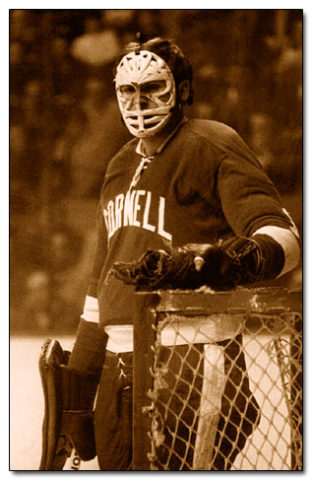
While two-time All-American Doug Ferguson led the offence, Dryden was dominant between the pipes. He went 26-0-1 that season, and led the NCAA with a ridiculous 1.46 GAA and .945 SV%, including four shutouts. The man who finished second in both categories, Tony Esposito, could not hold a candle to the future Stanley Cup champion that season.
After earning a shutout over WCHA-champion North Dakota in the semis, Dryden led the Big Red to face the Terriers one more time for the championship. Boston outshot Cornell 42-36 in the contest, but were only able to beat Dryden once, and the Big Red won the national championship by a final score of 4-1.
1968: University of Denver
After missing out on the tournament for the first time since 1962 the year before, the Pioneers looked to bounce back from a mediocre 1966-67 season. Things were not looking good early on, as DU went 2-3 to start the season. Then, after some exhibition games against some of the international teams prepping for the upcoming Olympics, Denver caught fire.
After the New Year, Denver won its final 17 regular-season games to capture the WCHA regular-season championship, and went on to become WCHA tournament co-champions after easing by both Minnesota-Duluth and Minnesota. All-American Jim Wiste led the charge, finishing tied for sixth in the country in scoring with 57 points.
The Pioneers made their way past Boston College in the semifinal, and met the other champion of the WCHA Tournament, rival North Dakota. It was the third time the two met in the final since their first meeting in 1959.
Neither team found the back of the net until the third period when Denver potted four goals, including two from Bob Trembecky. DU netminder Gerry Powers was solid in goal, making 22 saves, earning the first shutout in championship game history, and Denver won their fourth title by a score of 4-0.
1969: University of Denver
Similar to their 1967-68 campaign, the Pioneers stumbled out of the gate, once again going 2-3. However, they only faltered three times in their final 23 games and finished with the second-best record in the NCAA.
The Pioneers were stacked with a lot of returning talent, including Gerry Powers in net, and All-American Keith Magnuson manning the blueline. Offensively, they were led by sophomore George Morrison, whose 58 points were good for eighth in the country in scoring. His 41 goals led the Pioneers as well, and were the second-most in the NCAA.
Related: Top 10 Offensive Seasons in Maple Leafs History
After winning a share of the WCHA tournament championship, and trouncing Harvard in the semifinal, the Pioneers met the best team in the country that season, the Cornell Big Red. The goaltending matchup between Powers and Dryden certainly was the headline, with the Denver goaltender actually outdueling the future Montreal Canadien.
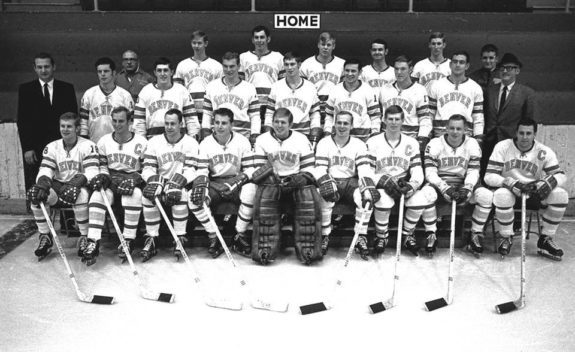
Cornell mustered up the most shots, putting 36 on goal to Denver’s 25. The scoring went back-and-forth, with the Pioneers scoring twice in the third period to put the game out of reach. Magnuson’s three assists helped earn him most outstanding player honours, and Denver won their fourth championship of the decade with the 4-3 victory.
The 1960s were certainly filled with more exciting contests. The competition level began to rise and carried over into the 1970s, as new dynasties formed. Despite their dominance in the decade, neither Denver nor North Dakota won another championship until 1980. Yet, it did not take away from their accomplishments in the 1960s.
The post NCAA Hockey National Championship History: The 1960s appeared first on The Hockey Writers.
Popular Articles

















































 Canucks Vancouver
Canucks Vancouver Sharks San Jose
Sharks San Jose Flames Calgary
Flames Calgary Avalanche Colorado
Avalanche Colorado Coyotes Arizona
Coyotes Arizona Golden Knights Vegas
Golden Knights Vegas Wild Minnesota
Wild Minnesota Red Wings Detroit
Red Wings Detroit Blues St. Louis
Blues St. Louis Blackhawks Chicago
Blackhawks Chicago Blue Jackets Columbus
Blue Jackets Columbus Hurricanes Carolina
Hurricanes Carolina Jets Winnipeg
Jets Winnipeg Predators Nashville
Predators Nashville Ducks Anaheim
Ducks Anaheim Oilers Edmonton
Oilers Edmonton Sabres Buffalo
Sabres Buffalo Rangers New York
Rangers New York Bruins Boston
Bruins Boston Panthers Florida
Panthers Florida Senators Ottawa
Senators Ottawa Lightning Tampa Bay
Lightning Tampa Bay Capitals Washington
Capitals Washington Islanders New York
Islanders New York Devils New Jersey
Devils New Jersey Maple Leafs Toronto
Maple Leafs Toronto Flyers Philadelphia
Flyers Philadelphia Penguins Pittsburgh
Penguins Pittsburgh Stars Dallas
Stars Dallas Kraken Seattle
Kraken Seattle Kings Los Angeles
Kings Los Angeles






